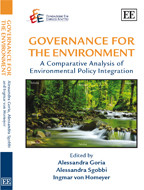Governance for the Environment : a Comparative Analysis of Environmental Policy Integration

12.04.2010
Alessandra Goria, Alessandra Sgobbi and Ingmar von Homeyer
Edward Elgar, Series on Economics, the Environment and Sustainable Development
The integration of environmental concerns into other policy areas is
widely recognized as a key element to achieve sustainable development.
It also represents a challenge for the environmental community,
requiring not only a new approach to policy-making but also changes to
existing policies and their implementation. This essential book presents
a diverse set of perspectives and experiences on how to support
sustainable development through the integration of environmental issues
into various policy sectors.
The authors examine existing research on environmental policy
integration (EPI) at three levels of policy-making: the national level,
in relation to both strategic and sectoral decision-making; the regional
level, where both supra-national and sub-national regional entities are
discussed; and the local level, where strategies available to
municipalities or individuals for furthering environmental policy
integration are presented. New and innovative approaches to the study of
EPI at these levels of governance are also proposed. They also
demonstrate how the effectiveness of EPI depends on factors such as
national, legal and administrative structures and culture, the stage of
the policy cycle to which EPI measures are applied, and the level of
integration among various modes of governance and instruments.
Academics, graduate and postgraduate students in social, political
and environmental sciences will find much of interest in this unique
book. NGOs and representatives of public and private institutions
working on environmental policy issues will also find this book an
invaluable resource.
Contributors: Michela Catenacci, Frank J. Convery,
Bruno Dente, Kenneth Hanf, Andrew Jordan, Keti Medarova-Bergström, Josu
Mezo,Carolina Pacchi, Adam Paulsen, Duncan Russel, Philipp Schepelmann,
Alessandra Sgobbi, Tamara Steger, Georgios Terizakis, Davide Zanoni
The integration of environmental concerns into other policy areas is widely recognized as a key element to achieve sustainable development. It also represents a challenge for the environmental community, requiring not only a new approach to policy-making but also changes to existing policies and their implementation. This essential book presents a diverse set of perspectives and experiences on how to support sustainable development through the integration of environmental issues into various policy sectors.
The authors examine existing research on environmental policy integration (EPI) at three levels of policy-making: the national level, in relation to both strategic and sectoral decision-making; the regional level, where both supra-national and sub-national regional entities are discussed; and the local level, where strategies available to municipalities or individuals for furthering environmental policy integration are presented. New and innovative approaches to the study of EPI at these levels of governance are also proposed. They also demonstrate how the effectiveness of EPI depends on factors such as national, legal and administrative structures and culture, the stage of the policy cycle to which EPI measures are applied, and the level of integration among various modes of governance and instruments.
Academics, graduate and postgraduate students in social, political and environmental sciences will find much of interest in this unique book. NGOs and representatives of public and private institutions working on environmental policy issues will also find this book an invaluable resource.
Contributors: Michela Catenacci, Frank J. Convery, Bruno Dente, Kenneth Hanf, Andrew Jordan, Keti Medarova-Bergström, Josu Mezo,Carolina Pacchi, Adam Paulsen, Duncan Russel, Philipp Schepelmann, Alessandra Sgobbi, Tamara Steger, Georgios Terizakis, Davide Zanoni
